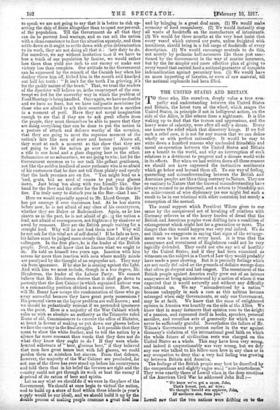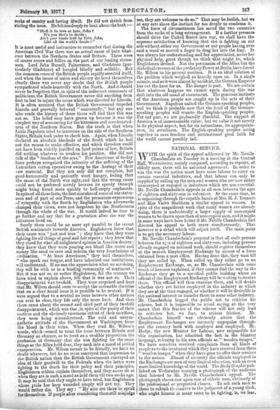THE UNITED STATES AND BRITAIN.
TO those who, like ourselves, deeply value a true sym- pathy and understanding between the United States and Britain, the latest turn of the wheel, which ranges the United States, in principle if not in belligerent action, on the side of the Allies, is like release from a nightmare. It is like waking up to find that the terrors and oppressions, and the heavy sense of calamity, were after all only a dream. Every one knows the relief which that discovery brings. If we feel such a relief now, it is not for any reason that we can define wholly or with perfect rationality. " It would be easy to write down a hundred reasons why unclouded friendship and moral co-operation between the United States and Britain are a benefit to- the world, and why an interruption of such relations is a detriment to progress and a disease world-wide in its effects. But when we had written dowo all those reasone we should not have- expressed- the instinctive sentiments which go below and beyond them all. To our way of feeling, quarrelling and misunderstanding between the British and American peoples are like a thing contrary to Nature. They are. so contrary to Nature that the times of misunderstanding.have always seemed to us abnormal, and a return to friendship not- an achievement of wise diplomacy (as one might feel such a result to be in our relations with other countries) but merely a. resumption of the normal.
The moral support which President Wilson gives to our cause by the unequivocal act of breaking off relations with Germany relieves us of the heavy burden of dread that the British and American peoples were drifting into a condition of estrangement which might last for a generation or more. The danger that this would happen was very real indeed. We do not think we exaggerate in saying that signs of the estrange- ment were to be seen on every hand. it is true that the annoyance and resentment of Englishmen could not be very logically defended. They could not cite any act of hostility by the United States; and if they had been examined as witnesses on the subject in a Court of Law they would probably have made a poor showing. But it is precisely feelings which are not easily defended on the grounds of definite wrongs-done that often go deepest and last longest. The resentment of the British people against America really grew out of an intense annoyance at being misunderstood by a nation of whom it wars expected that it would naturally and without any diffietilty understand us. We say "misunderstood by a nation" because unhappily in such a case as this nations become estranged when only Governments, or only one Government, may be at fault. We know that the mass of enlightened opinion in America was heartily on the side of the Allies. Wa know that in many instances that opinion rose to the-height of a passion, and expressed itself in books, speeches, personal sacrifice, and countless acts of generosity for which we can never be sufficiently grateful. Nevertheless the failure of Mr. Wilson's Government to protest earlier in the war against Germany's violation of the international good faith on which the whole future of civilization, rests was charged on the United States as a whole. This may have been very wrong, and indeed it unquestionably was very wrong, but we defy any one who talked to his fellow-men here in any clasa or in any occupation to deny that a very bad feeling was growing up between Britain and America. The feelings of the British people may best be described by the compendious and slightly vague won' "sore -heartedness.' They were exactly those of Lowell iviien in the deep en-LA:ideas of the American Civil War he addressed-John B :- "We--know we've got a. cause, John, Thet's honest, just, an' true; . We thought 'twould win applause, jape Ef nowheres else, from yam."
Lowell saw that the two nations were driftiu on to- -the reeks of enmity and lasting He did nat shrink from stating the issue. He felttoo deeply to beat about the bush: "Shall it be love or hate, John ? TVs you thet's to decide ;
Ain't your bonds held by Fate, John, Like all the world's beside 7 "
it is most useful and instructive to remember that during the American Civil War there was no actual cause of hate what- ever between the Northern States and Britain. There were of course errors and follies on the part of our leading states- men. Lord John Russell, Palmerston, and Gladstone (par- ticularly Gladstone) all bungled blindly and selfishly. But the common-sense of the British people rapidly asserted iteclf, and when the issues of union and slavery declared themselves -dearly there was never any doubt that the British people sympathized whole-heartedly with the North. And it should mews be forgotten that, in spite of the indiscreet comments of politicians, the British Government never did anything from that to last to injure the cause which was directed by Lmcoln. It is often assumed that the British Government impeded Lincoln and generally behaved " unneutrally," but any one who reads the history of those times will find that this was not so. The belief may have grown up because it was the simplest way of accounting for the bitterness and sore-hearted- ness of the Northern States. But the truth is that when Louis Napoleon tried to intervene on the side of the Southern States, Britain took pains to check him. Again, when Lincoln declared an absolute blockade of the South which he had not the means to make effective, and which therefore could not have been strictly justified on hard points of law, Britain did nothing whatever to weaken his position. She did not talk of the " freedom of the seas." Few Americans of to-day have perhaps recognized the intensity of the suffering of the' Lancashire cotton operatives owing to the t hortago of their raw material. But they not only did not complain, but good-humouredly and patiently went hungry, feeling that the cause of the North was right, and that the wrong cause could not be preferred merely because its speedy triumph might bring bread more quickly to half-empty cupboards. In spite of all these facts, the first mistakes of some of our states- men and of part of our Press, and the premature expressions of sympathy with the South by Englishmen who afterwards changed their views, were not forgotten by the Northerners through the whole of the war. It would indeed be true to go further and say that for a generation after the war the bitterness lived on.
Surely there could be no more apt parallel to the recent British sentiments towards America. Englishmen knew that their cause was " just and true " ; they knew that they were fighting for all things of good and fair repute ; they knew that they. stood for what all enlightened opinion in America desires ; they knew that they were pouring out blood like water and money like sand to-save and redeem the very foundations of civilization. " At least Americans," they told themselves, " who speak our tongue, and have inherited our institutions, will understand. If no one else appreciates what we are doing, they will be with us in a binding community of sentiment." But it was not so, or rather Englishmen, for the reasons we have tried to explain above, felt that it was not so. Their disappointment was twofold. They were surprised and hurt that Mr. Wilson should seem to accept the untenable doctrine that on a clear moral issue it is possible to be neutral. If it were argued that to a neutral no issue between other nations can ever be clear, they felt only the more hurt. And thus there came about the second and chief part of their twofold disappointment, which was that, in spite of the purity of their motives and the obviously enormous extent of their sacrifices, they were being misunderstood. The cold and unsym- pathetic attitude of the Government at Washington froze the 'blood in their veins. When they read Mr. Wilson's words, which seemed to treat the issue between Britain and Germany as obscure, or to treat as a credible proposition the profession of Germany that she was fighting for the same things as the Allies hold dear, they sank into a mood of settled exasperation. Mr. Wilson meant to be friendly, we have no doubt whatever, but he no more conveyed that impression to the „British nation than the British Government conveyed an idea of their goodwill to the Federals when the latter were fighting to the death for their polity and their principles. Englishmen seldom explain themselves, and. they never do so when they are in such a mood as held them till two weeks ago. It may be said that they ought to have tried, but Englishmen whose pride has been wounded simply will not try. They would rather die. They say : " My acts aro there to speak for themselves. If people after considering them still misjudge me, they are.welcome to dose." That may be foolish, but we at any rate share the instinct far too deeply to condemn it. The force of circumstances has saved the two countries from the rocks of a long estrangement. If a further pressure should drive the United States into war, we shall have the supreme satisfaction of knowing that she is fighting on our side without either our Government or our Reople having ever said a word or moved a finger to drag her into the fray. It was always her understanding and her appreciation, never her physical help, great though we think that might be, which Englishmen desired. Not the persuasion of the Allies but the diabolical excesses of the predatory Power at Berlin have forced Mr. Wilson to his present position. It is an ideal solution of the problem which weighed so heavily upon us. In a single minute, and as it were almost by accident, the German Emperor has cut the knot for us. The danger is past. We are certain that whatever happens we cannot again during this war drift into the old mood of resentment. The generous instincts of the American people are caught up in the acts of their Government. Napoleon united the German-speaking peoples, and we think it probable now that the head of the German- speaking peoples will reunite the English-speaking peoples. For our part, we are profoundly thankful. The support of America is of immeasurable value; but we value it not merely in its physical aspect, but for its naturalness, its appropriate- ness, its seemliness. The English-speaking peoples acting together to save freedom and international good faith for the world cannot possibly fail.



































 Previous page
Previous page